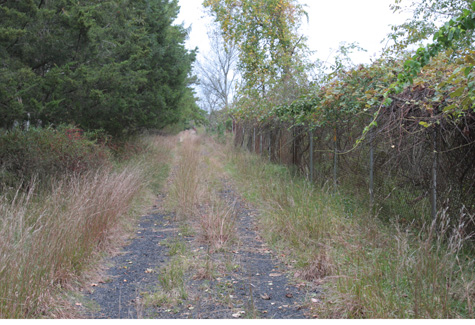Amper calls on environmentalists to draw up EPCAL plans

Environmentalists, grab your pens and pads and blueprints.
You’ve got an empty canvas, so to speak. Thousands of acres of undeveloped land in Calverton.
Long Island Pine Barrens head Richard Amper said this week he will be urging environmentalists to come up with a plan of their own on how to develop the Enterprise Park at Calverton.
This, he says, is necessary because Riverhead Supervisor Sean Walter “is launching a one-man war on the environment.”
Mr. Amper’s rallying cry comes just a few weeks after Mr. Walter contacted the area’s three federal representatives, Congressman Tim Bishop and U.S. Senators Charles Schumer and Kirsten Gillibrand, in an effort to jump-start development at the former Grumman site, saying the land was given to the town by the federal government for economic development — and the state has hindered this goal.
Mr. Amper says the supervisor is also trying at the state level to circumvent the state Pine Barrens Act.
“Sean Walter’s effort to have the federal government supersede state environmental law at EPCAL has been compounded by his new proposition that the Pine Barrens Act does not apply to government-owned land and has set him on a collision course with environmentalists,” Mr. Amper said in an interview this week.
“Add to this the town’s approval of storage of Sandy-wrecked cars in a state-designated Special Groundwater Protection Area in the Pine Barrens at EPCAL and it seems he’s declared a war on water and habitat exceeding anything heretofore,” Mr. Amper said. “I will now urge environmentalists to advance an EPCAL development plan that will protect the ecosystem and permit appropriate development to avoid further delay in economic development of the property.”
Mr. Amper said his ultimate goal would be to convince the town to accept whatever plan the environmentalists drew up.
Reached for comment, Mr. Walter dismissed the outspoken Mr. Amper as just trying to draw attention to himself and his nonprofit group.
“That would be Dick Amper just wasting a lot of time,” Mr. Walter said.
The town has been trying to develop town land at EPCAL, the site of a former Grumman naval weapons plant, for several years now, and both Mr. Walter and his predecessor, Phil Cardinale, have complained about state bureaucracy, specifically the state Department of Environmental Conservation, impeding that goal.
DEC officials counter that they’ve never rejected any plan the town has proposed for EPCAL.
The town is in the process of having an environmental study and subdivision map created for EPCAL in hopes this will make the property easier to develop.
In addition to contacting the area’s federal representatives, the Town Board also has met publicly with former Congressman George Hochbrueckner, who was instrumental in getting the EPCAL land turned over to the town, instead of being sold, after Grumman left.
Mr. Hockbrueckner said it was always the goal to have the land developed as “economic development” that would replace the jobs lost when Grumman left the area.
Mr. Amper is also saying the town has sent a series of letters to the state Pine Barrens Commission — a multi-jurisdictional government agency that regulates development in designated pine barrens areas — claiming government projects are exempt from the commission’s jurisdiction.
In an Oct. 16 letter to Suffolk County Water Authority attorney John Milazzo, deputy Riverhead Town attorney Dan McCormick claims that a recent state Supreme Court ruling involving the county’s Southaven Park Trap and Skeet Range expands the scope of the term “public improvement and/or recreation uses” to include a county-maintained shooting range.
“If a shooting range is now judicially recognized as a ‘public improvement,’ it is reasonable to conclude that most, if not all, other municipally sponsored projects are public improvements as well,” Mr. McCormick writes, according to a copy of one of the letters Mr. Amper turned over to the News-Review.
In the Southaven case, the judge found that the Pine Barrens Commission’s ruling that the reopening of the skeet range constituted development “was arbitrary, capricious and irrational.”
In an Oct. 10 letter to Mr. Walter, John Pavacic, executive director of the Pine Barrens Commission, wrote that “government uses are not expressly exempted from being subject to the comprehensive land use plan” of the Pine Barrens Act. He wrote that government uses are addressed as either non-development, which are exempt, or development, which are not, and that these definitions are spelled out in the law.
Mr. Amper said one only needs to read the Pine Barrens law to see that government activities are not expressly exempt.
“The town could make tens of millions of dollars more if it could agree to do development at EPCAL in an environmentally sensitive way,” he said. “It is my opinion that town supervisors, from Jim Stark to the present, have blamed the environment as an obstacle to developing EPCAL. It’s just a political excuse. The salamanders and owls are not preventing EPCAL from being developed, inept politicians are.”
“I’m not blaming the environment,” Mr. Walter responded.
Asked what he is blaming, he replied, “Bureaucracy. But we’ll get through it.”








